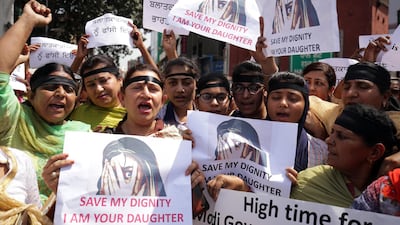A brutal rape. National outrage. Repeat. The usual way it goes in India, some might say. Except that it hasn't really happened that way this time round, with the gang rape and murder of an eight-year-old girl in Kashmir.
The reaction has been delayed, patchy and polarising. Politicians, lawyers and sections of the public have picked sides in the name of religion and patriotism rather than the principles of natural justice.
The reasons why, and what they might say about India today, has provoked some self-examination and self-loathing. Even the UN secretary-general’s spokesman has weighed in, making the case all the more unusual.
But the facts of the matter are plain. The victim, Asifa Bano, was Muslim and belonged to a nomadic tribe that roamed parts of the disputed state of Kashmir. Her body was found in the forest on January 17, a discarded doll-like figure in a blood-stained purple outfit. Initially, there was little national awareness of the case and its rights and wrongs. But even after Indians began to call for justice for the child, the public reaction has certainly not been anything like the tsunami of fury and grief that swept the country in 2012.
In December of that year, a 23-year-old woman was gang-raped on a moving bus in Delhi and left for dead on the roadside. When she succumbed to her injuries a few days later, millions honoured her as "India's daughter", celebrating her indomitable spirit, lamenting her ordeal and seeking harsh punishment for her assailants. Until the woman's name became public, Jyoti Singh was known by heroic pseudonyms such as "nirbhaya", meaning fearless.
But for eight-year-old Asifa, the grief has been more reserved, leading a prominent Indian sociologist to ask if Hindu-majority India, governed by the Hindu nationalist BJP, has become morally "unconscious" towards its minority communities. Even the many marches for justice through various Indian cities last Sunday did not focus squarely on the tragedy of the dead child. Instead, the placard-bearing crowds demanded justice for other victims as well, not least a 16-year-old allegedly raped a year ago in India's most populous state, Uttar Pradesh. A BBC correspondent in India noted that the protests on behalf of Asifa Bano were "milder" than in 2012.
Is it right to infer from the response that Asifa’s short life and cruel suffering at the end are somehow deemed to matter less? If so, why? There should be no hierarchy of victims. Indeed, Singh suffered grievously too. But there does, tragically, seem to be a hierarchy at work with respect to Asifa.
First, she was not a member of rising India’s aspirational class, had never been to school and was known only for the pleasure she took in playing in a meadow. Second, her community, the Muslim Bakerwals, are viewed with antipathy by local Hindus.
Third, her rape and murder have been turned into a religious and nationalist test of strength by local Hindu politicians and lawyers. They have expressed solidarity with Asifa’s alleged killers and claimed the Bakerwals are pro-Pakistan (and therefore anti-India). Some have refused to allow local police to investigate the case because a few officers are Muslim and supposedly cannot be trusted to be impartial. Remember Donald Trump’s refusal to believe an American judge of Mexican ethnicity could ever be impartial enough to do his job?
Overall, it is not hard to spot the differences between Asifa and Singh and the reasons for the very different public response to their tragedies. Singh was training to be a physiotherapist. She was raped on her way home from seeing a new Hollywood film with a male friend. She was Hindu and lived like millions of young, urban Indians. As a leading female Indian television journalist put it, Singh "could have been any one of us".
Not so Asifa, playing in the far-off meadows of Kashmir. Class, religion and a perverse patriotism have played a dreadful role in her case.
But sections of the Indian media have recently highlighted it and asked pointed questions about the lack of official and public empathy for the child. This has led to international mention, including from the United Nations.
There are signs the Indian authorities are paying heed. Prime Minister Narendra Modi belatedly spoke out, assuring justice for "our daughters", without mentioning Asifa Bano by name. On Monday the trial began of eight men arrested in connection with her rape and murder. That is relatively speedy for India, although there is no certainty when, or even if, a conviction will be secured.
None of this, however, can erase the stain on India’s reputation. Whether or not one has justice in India today seems to be determined by biography, geography and political expediency.


